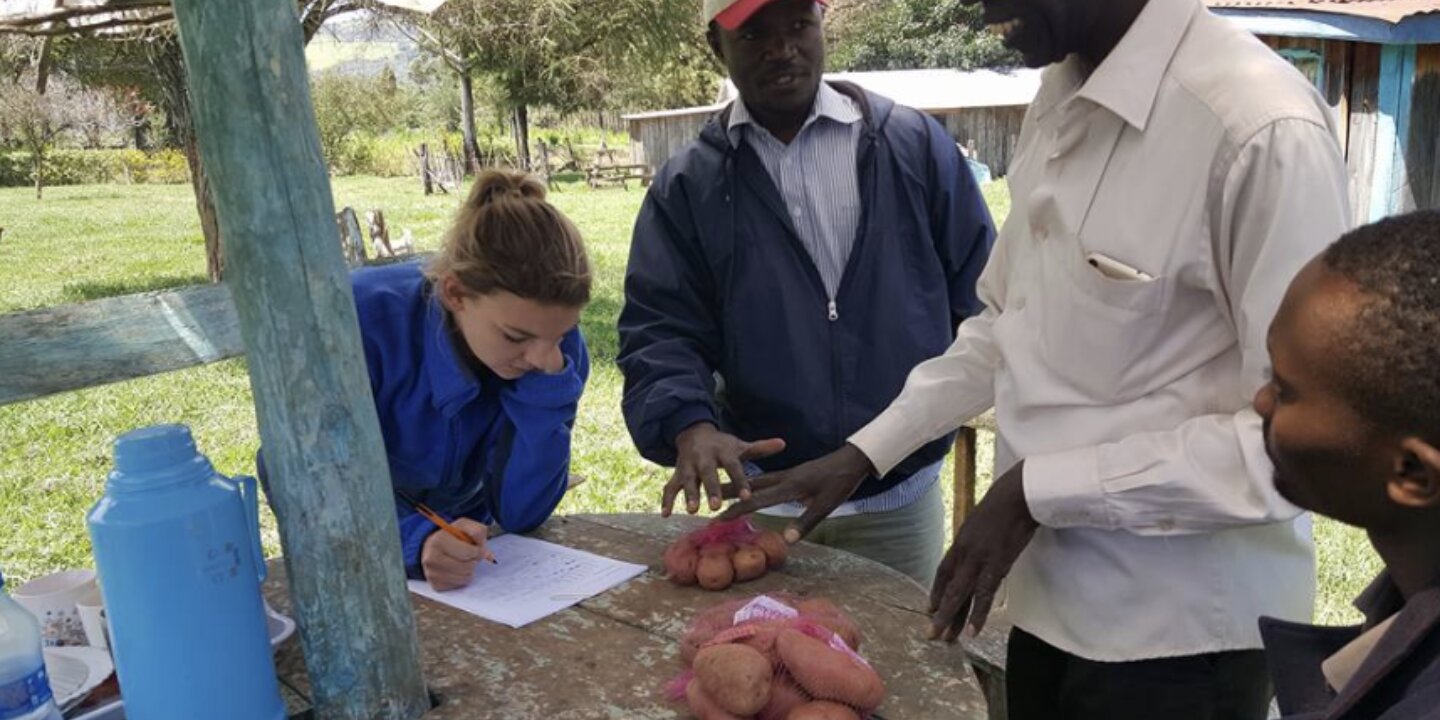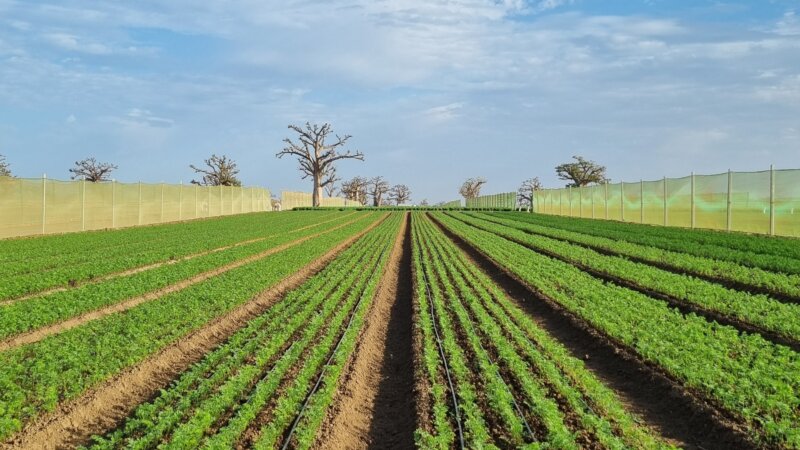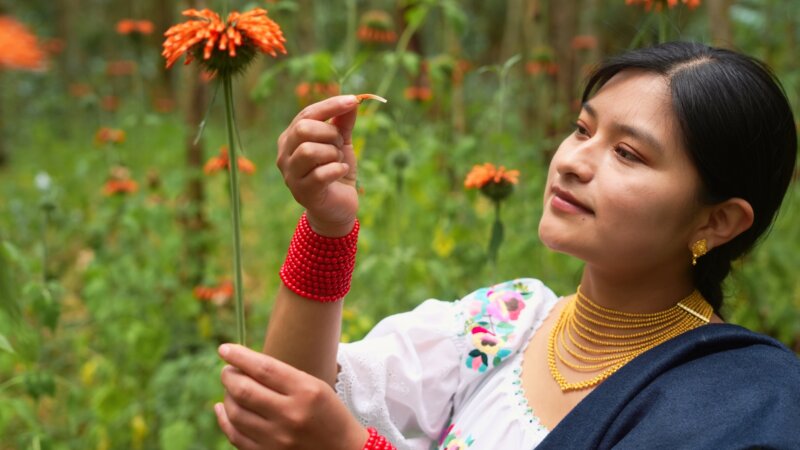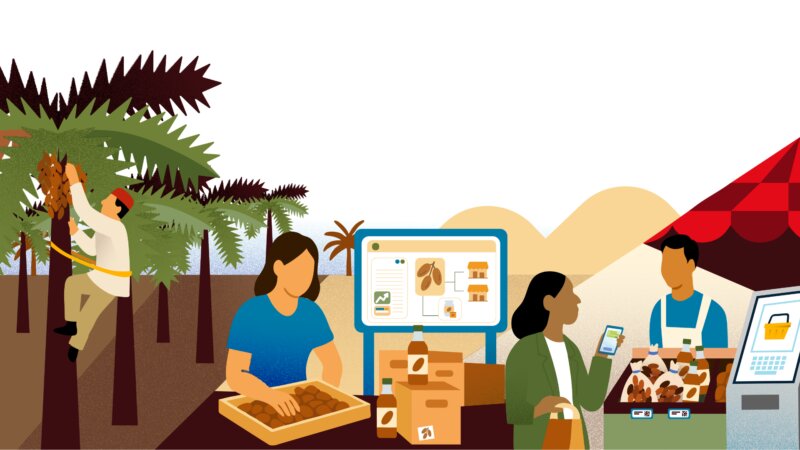Interview with Dr. Fleur Kilwinger | Research methods shaping seed systems?

On July 5th Dr. Fleur Kilwinger was awarded at Wageningen University with the degree of Doctor of Philosophy, with the predicate Cum Laude. She conducted her PhD research in collaboration with CGIAR, and her research focuses on the functioning of seed systems of vegetatively propagated crops, making important methodological contributions to the field. Her insights are relevant to both the SeedNL network as well as those interested in the benefits of collaborating with CGIAR. We therefore asked Fleur a few questions to share some of her main insights.
The benefits of doing research in partnership
We started the interview asking Fleur to share a bit about the collaboration between Wageningen University & Research and CGIAR; focusing specifically on the Research Programme on Roots, Tubers and Bananas. Fleur explained the collaboration provided opportunities to link the scientific knowledge and PhD guidance at Wageningen University & Research with the wealth of field experience, international network, and practical support from CGIAR. Promotor Cees Leeuwis and co-promoter Conny Almekinders are Senior Experts in the NL-CGIAR Strategic Partnership and ensured funding for this collaboration.
Fleur highlighted one experience in which the collaboration was particularly fruitful. This was the occasion where she was focusing on one of the methods used in the RTB toolbox called the means-end chain analysis. In this occasion, knowledge on the method from Wageningen University & Research was directly shared with the CGIAR RTB team through a brief training. In addition, Fleur noted that through her involvement with CGIAR she was also able to directly provide input for the development of the RTB Research Programme. In this way, close links between academic and field research were established.
Matching the questions with the method
Next, we wanted to learn more about the content of her PhD. Fleur explained that she applied and evaluated research methods that are used to increase understanding about smallholder farmers’ seed-sourcing practices for vegetative propagated crops in Eastern-Africa. The methods studies in the toolbox originate from several disciplinary fields and have been adapted to the application in seed systems of vegetatively propagated crops. Per example, the Means-end chains is a method used in the context of consumer studies.
Fleurs’ research shows how different methods produce different results, leading to different insights. She explained that, in this way, each research method “shows” things, but at the same time, unavoidably, leaves other things “in the dark”. This notion that each research method produces presences and absences at the same time is captured by the concept of “performativity”. In the discussion of her dissertation she uses this concept to argues that the researchers’ choice of methods to study seed systems does not only define the type of results, i.e. insights, that are produced, but also contribute to the future shape of these seed systems. Fleur elaborated that she notes a trend towards increased application of quantitative methods throughout the project cycle including base- and end lines, monitoring and evaluation (ME), experiments, etc. In many organizations, surveys have become the ‘go-to’ method to demonstrate impact at scale. However, Fleur pleads for cost-effective exploratory research with the argument that on some occasions it is possible to gather valuable information through conducting 20 in-depth interviews and working with a small budget (in the RTB Toolbox this approach is called small N research. Moreover, she underlines the importance of interdisciplinary research and mixed methods to study the complex and evolving question of farmer demand for quality seed: “We need to look on a case-by-case basis linking the right research question with the right methods”. To move to a more holistic understanding of seed-sourcing practices, Fleur recommended combining diverse research methods from different disciplines as a first step.
Unique character of vegetatively propagated crops
We also asked Fleur to share more about the focus of her research on vegetatively propagated crops. For reproduction of such crops parts of the plants, such as stems, tubers or roots, are used to produce new plants. She explained that this focus on the reproducibility of crops is particularly relevant as a lot of academic research still concerns staple crops like maize and rice from which the insights are not always applicable to vegetative propagated crops. To illustrate, if you would classify ‘seed’ as an economic good, the characteristics of hybrid maize seed are comparable to those of a single use product: it cannot be reproduced while maintaining its genetic identity. Thus, demand for hybrid maize seed can be created and predicted relatively easily by seed companies operating in the formal seed system. On the contrary, the characteristics of sweet potato, potato and banana seed come closer to those of durable products and can be multiplied by farmers whithout losing their genetic character. In maize, the formal and informal seed systems are separated by the ‘natural’ intellectual property protection, or economic sterility, of hybrids. In developing countries, the formal and informal seed systems of vegetative crops are not easily kept separate. Fleur elaborates that it is highly likely that farmers will multiply popular varieties of vegetatively propagated crops themselves in which case the varieties from the formal system are multiplied and distributed through informal systems.
We asked Fleur two additional questions to understand the seed system opportunities for vegetatively propagated crops better.
- Firstly, is it possible to launch commercially viable, formal seed systems for vegetatively propagated crops in developing countries?
Fleur explained that farmers will buy a new variety, in case they favour it, once and will likely continue to multiply this variety until there is a new, better variety or their planting material has, through repeated multiplication, become too diseased with viruses and other pathogens that carry over with vegetative propagation (this phenomenon is referred to as degeneration). Companies may develop varieties with resistance to those diseases, but then the seed of those varieties that farmers have ‘milder degeneration patterns’ and leaves the farmer without reason to buy (clean, healthy) seed again. Thus, by developing the best varieties, companies undermine their own business model: making farmers buy seed every season. This means that for vegetatively propagated crops there is an inverse relationship between the quality of the variety and seed sales: as quality increases, seed sales decreases. Fleur made a comparison with a vacuum cleaner. You buy a new one when the old one breaks: do companies then have an incentive to develop an everlasting vacuum cleaner? - Secondly, is formalisation of vegetative seed systems desirable in developing countries?
Fleur commented that this provides a second dilemma. Informal, local seed systems harbour genetic diversity. When farmers start growing a smaller selection of commercial varieties, this often replaces the local cultivars, partially or totally, resulting is less genetic variation and resilience. In bananas, we have seen the rise of Fusarium wilt, which destroyed a major part of the commercial banana tree plantations around the world. The dominant but susceptible export variety Gros Michel had to be replaced with the less susceptible variety Cavendish. Farmers growing many different types of banana varieties are less exposed as one or more varieties they already grow might be resistant. If seed systems resilience reduces because of a loss of diversity, the formal seed system becomes more important to prevent, and recover from, disease outbreaks. Nevertheless, in vegetative crops, breeding is challenging, and trait stacking is highly challenging because of genetic complexity (‘polyploidy’). In maize, a new resistance gene is easily added to an existing variety using hybrid breeding. In potato, this can only be done fast through GMO.
Public-Private partnerships
Fleur explains that as a full transition to formal seed systems for vegetatively propagated crops seems unlikely in developing countries, partnerships are important. The public, private and development sector must work together to increase farmer productivity and resilience. Such partnerships should have antennas to detect and mitigate threats to vegetative seed systems. Moreover, they can work and invest together to improve the seed system in the absence of strong commercial incentives.
Food for thought
In terms of development cooperation, Fleur does wonder whether we are bringing outdated models from our industrialised societies to developing countries. “There is a major nitrogen problem in the Netherlands. Should we introduce varieties requiring more chemical fertilisers in developing countries too?”
Author

Mariëlle Karssenberg
Partnership Builder - Netherlands Food Partnership



